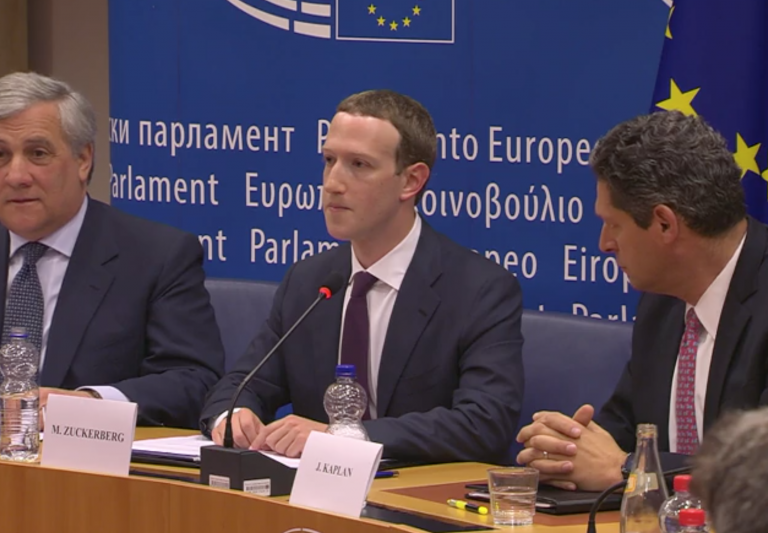Mark Zuckerberg let off the hook by shambolic European Parliament grilling
An attempted grilling of Facebook boss Mark Zuckerberg at the European Parliament ended in angry scenes on Tuesday evening after MEPs complained the chaotic questioning format they were given let the Silicon Valley CEO off the hook.
An opening statement by Mr Zuckerberg was followed by a long succession of meandering questions to the tech boss by MEPs – with the social network founder then given 15 minutes to answer questions at the end as he chose, with no right to follow-up for the questioners.
The format of the meeting, which was only even made public after an earlier rebellion by MEPs during the planning stage, meant Mr Zuckerberg barely broke a sweat during questioning – apart from at the end, where he appeared uncomfortable when pressed to give better answers by MEPs speaking out of turn.
Mr Zuckerberg acknowledged the limitations of the format at the end of the session, telling MEPs: “I realise there were a lot of specific questions that I didn’t get to specifically answer, but going around and hearing the themes of what people are concerned about, had questions about, I think I was able to address the high level areas in each.
He added that he would “make sure that we follow up with each of you afterwards” and “have someone to come to do a full hearing soon to answer more of the technical questions as well”.
But most MEPs did not seem impressed. Speaking out of turn, Green group co-leader Philippe Lamberts said: “Will you allow users to escape targeted advertising? I mean I asked you six yes or no questions, I got not a single answer! You asked for this format for a reason.”
Guy Verhofstadt, the liberal group leader, said Mr Zuckerberg should go around, collect the written notes of the questioners, and use them as a basis for a full written response.
I asked you six yes or no questions, I got not a single answer! You asked for this format for a reason.
Philippe Lamberts, Green group co-leader
“Today's pre-cooked format was inappropriate and helped to ensure that Mr Zuckerberg could get away without answering any of our fundamental questions,” he told The Independent after the session.
“I trust as a minimum that written answers from Facebook will be forthcoming. If these written questions are not accurately answered in detail the EU competition authorities will have to be activated and legislation sharpened.”
At one point during the questioning Syed Kamall, the leader of the Conservatives’ ECR group, tried to press Mr Zuckerberg on the issue of “shadow profiles” – data Facebook retains on people who do not use Facebook. Mr Zuckerberg simply said: “We think it’s important to keep it to protect people in our community” – before pointedly asking if there were any other topics to address.
Antonio Tajani, the president of the European Parliament who had organised the session, was at one point forced to use his gavel to restore order. He excused the Facebook CEO by saying Mr Zuckerberg had a flight to catch, prompting MEPs to joke that French air traffic control was on strike so this could not be the case.
In his prepared statement at the beginning Mr Zuckerberg apologised to Europe for fake news and for not doing enough to recognise interference in elections.
“Over the last couple of years that we haven’t done enough to prevent these tools from being used for harm as well: that goes for fake news, foreign interference in elections, and developers misusing people’s information. We didn’t take a broad enough view of our responsibility and that was a mistake, and I’m sorry for it,” he said, adding that the company would make “significant investments” that would “significant impact our profitability”.
“I want to be clear, keeping people safe will always be more important than maximising our profits.”
The tech boss said Facebook was not “prepared enough for the kind of coordinated misinformation operations that we’re now aware of” during the US president election of 2016 but that it had been better able to act during the French president election and the German elections of last year.
Outlining the company’s strategy to fight fake news, he added: “It’s worth noting that a lot of fake news is economically motivated not politically motivated. It’s much like email spam in that way: the playbook for fighting this is removing the ways that spammers can make money so then they just go and do something else.
“To do this we’ve banned sites that regularly run fake news from using our ads products so they can’t make money from it, we’ve built our systems to penalise clickbait and sensationalism.”
He was asked about issues ranging from whether Facebook was a monopoly to whether it cross-used data from its social network with the WhatsApp messenger app.
Mr Zuckerberg has turned down an invitation to appear before a House of Commons select committee in the UK, but appeared before the US congress earlier this year in two marathon sessions.

 Yahoo News
Yahoo News 

